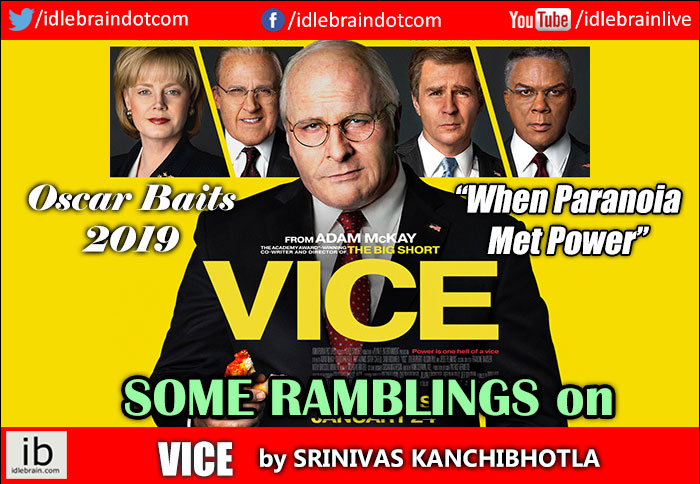
If not the present, at least history would look down upon his term with kinder eyes, opined George Bush at the end of his controversial reign reacting to opinion polls across the board that put him in the bottom percentile of presidential rankings. (Little could he imagine the only reason why that would happen was his fortune of being succeeded by another Republican President even more controversial and even more clueless). For all his posturing and bluster, one thing was certain that none regarded Bush as the true "decision maker", however much he bandied that word around, capable of absorbing a policy paper more than a single sheet length and take an informed decision based on its recommendations. Any person (leave alone a President) who throws around statements as "I know how the world works" (much the same way as the current resident of White House's "I know big words, I know all the big words") clearly has little inkling of the working of the complex geo-political machinery. But then, where did all the decisions comes from, that really reshaped the political jigsaw of the world from the already complicated to downright scary? The decisions of invading Iraq, without a proper plan, dismantling the Sunni power structure in the region to disastrous effects, pursuing the pipe dream of "spreading freedom in the region" through military means, the fatal consequences of each of which is still reverberating across the globe, came not from the bumbling President, who viewed the office as any other typical job and so promptly shut shop by 6p and retired to his quarters, but from the man behind the curtain, the master puppeteer, the Vice President, Dick Cheney.
No sooner had the President taken office in 2001 (it was reported) than Cheney rounded up his (neo-conservative) think tank to draw plans for invading Iraq, even before 9/11 even happened. And along with the war plans was a little reported incident about his meeting with the oil executives, in Chevron, Exxon-Mobil, and his former employer Halliburton, where operations were discussed in regard to carving up the oil fields in Iraq among the major player. All of which certainly explains the strange strategic and military shift the country has taken from "blowing the terrorists responsible for 9/11 out of their foxholes" in the Tora Bora mountains in Afghanistan to "deposing the mass murderous dictator Saddam Hussein who possesses weapons of mass destruction and is a clear and present danger to the United States". While the interventionist adventures happened on the foreign soils, the executive branch, read Cheney, was hell bent on its expansionist powers on the domestic front, sidestepping the legislative, and none too chilling than persuading the then Attorney General, John Ashcroft, ailing from a surgery on the hospital bed, to sign off on a secretive surveillance program on the American citizens, in the name of security, causing a serious showdown between the Justice Department and the White House. Oh, and there is also that case of "enhanced interrogation techniques" that CIA employed to torture the enemy combatants for information extraction, downright illegal under Geneva Conventions, at the behest of Cheney, whose subjective reading of the Conventions helped him deduce these combatants were not captured during any war and hence do not come under its purview, and moreover, America doesn't torture anyone... but it certainly doesn't stop the "Allies" torturing them to glean valuable information either, and even better, if all these happened in "Black sites" operated by the CIA in foreign nations away from the jurisdiction of the Americans laws. Two sectors greatly flourished under Cheney's regime working full time (and overtime too) - 1. security apparatus, to put into action his far reaching proposals 2. legal counsel, to exploit every single loophole within the Constitutional framework to justify such a blatant power grab.
For a man who had so little public exposure during his days in his administration, often preferring to operate from in the shadows, appearing in public only when it is an absolute must, and guarding his privacy like a hawk (an interesting anecdote about it, when he made the doctors remove his new pacemaker which could be remotely through wireless and put back in his old pacemaker for the fear that his enemies might gain control of it and stop his heart) the movie "Vice" could only depend on his policies and records of his interaction with other members of public administration to create a semblance of a portrait, which it does it admirably well. While the reasons for what made him so hawkish, beyond the normal conservative standards, so paranoid, as to suspect every piece of chatter on the intelligence radar as a distinct possibility, and so suspecting of everything and everyone around, causing him to setup offices in the White House, Pentagon and Capitol Hill and insisting on every piece of daily briefing information pass through him first before reaching the President's desk, remain vague, the movie rightfully takes the approach that it ultimately doesn't matter how noble the person's motivations are to keeping his country safe when his actions ultimately achieved results that were quite contrarian. Christian Bale, as usual, slips into the character, physically and phonetically, packing in all the pounds for the paunch and bringing down his voice an octave closer to his Batman growl.
Whether (a distant) history alone would provide a proper perspective, when judging events whose after effects still ripple through the fabric of time, is certainly debatable, it is equally difficult to have a completely objective view, sans any prejudice, no matter from how afar on such a contentious personality, who truly remade the world in his likeness, a place of bitterness, fear and mistrust, as he intended.
checkout http://kanchib.blogspot.com for Srinivas's Blog.
